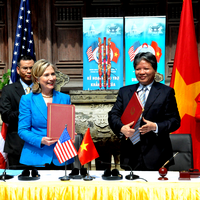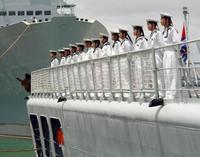U.S. President Barack Obama met with leaders from the 10 Association of Southeast Asian Nations (ASEAN) member countries in New York Sept. 24. In his opening remarks, Obama reiterated the U.S. intention, as “a Pacific nation,” to play a leadership role in Asia, and characterized closer relations with ASEAN as essential to that goal. Obama also confirmed that he would attend the East Asia Summit in Jakarta next year.
Southeast Asia Archive
Free Newsletter

Nuclear energy’s recent renaissance has seen the United States firm up nuclear cooperation agreements with a number of emerging nuclear nations. However the most eye-catching so far is the proposed deal with Vietnam, which stands out not only for its departure from the standard template of such deals, as epitomized by the U.S.-UAE nuclear agreement, but also because it comes at a time when Sino-American interests have been at odds in the South China Sea. More broadly, the deal reflects the unfolding American strategy to counter Chinese assertiveness in the Asia-Pacific region. Nonproliferation hawks are up in arms that the […]

With little more than 50 days left until elections on Nov. 7, tensions are rising noticeably in Burma — the country renamed Myanmar by its military rulers. The junta that keeps the country in its steely grip is trying to make sure the election goes off exactly as planned — which is to say, without triggering a new revolt, let alone a full-fledged revolution, and without producing an electoral outcome that would embarrass the regime or weaken its hold on power. The regime is so nervous that it recently ordered the temporary suspension of the magazine Modern Times as punishment […]

China’s remarkable weathering of the global recession has accelerated the expansion of its power relative to that of the West. American observers of China have already noted an increasingly assertive approach by Beijing, and attribute this shift in behavior to an expectation among China’s leaders of a greater degree of deference and influence in international affairs. Nowhere is this dynamic more apparent than in regional maritime issues, where Beijing’s interests in maintaining access to foreign resources and enforcing its claims of sovereignty mix with foreign perceptions of Chinese intentions and external reactions to China’s decades-long military modernization program. Fueled by […]
Singapore and Taiwan may sign a free trade agreement, according to officials from both countries. In an e-mail interview, Sheridan Prasso, an Asia Society associate fellow, discusses the evolution of Taiwan’s trade policy. WPR: What has historically been Taiwan’s trade policy? Sheridan Prasso: For decades, Taiwan was able to sustain a high rate of growth by using its low-wage workforce to turn out consumer goods such as shoes and apparel, and electrical products such as clocks and calculators. Much of this was exported to markets in North America and Europe. “Made in Taiwan” was as ubiquitous in the 1960s-1980s as […]
A propos my post of the other day, here’s more along the same lines from Carlyle Thayer writing at East Asia Forum, who frames it as China’s soft power vs. U.S. smart power. And once again, U.S. smart power seems to have made a significant comeback. Significantly, as Thayer puts it, “The timing is bad for China as the regional security architecture looks set to gain a new lease on life and expand into new areas of cooperation.” Add to that the fact that the soon-to-include-the-U.S. grouping, EAS, is apparently gaining an edge over the sans-U.S. ASEAN+3 grouping favored by […]
